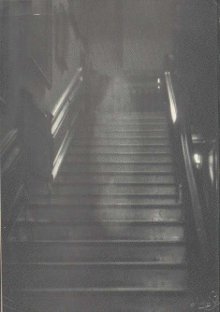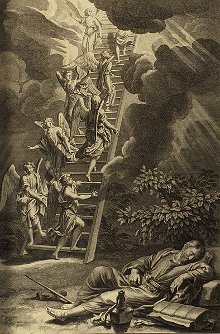 A ghost is a deceased person that haunts the living, because the deceased person has unfinished business or lost property that was highly important to him. In spite of what healthy skepticism might prompt me to believe, I believe in ghosts, because I have seen many of them.
A ghost is a deceased person that haunts the living, because the deceased person has unfinished business or lost property that was highly important to him. In spite of what healthy skepticism might prompt me to believe, I believe in ghosts, because I have seen many of them.
As an atheist and a skeptic, however, I must insist that ghosts are tangible characters. So, when popular belief stipulates that ghosts are spirits, I must insist that this cannot be, and I also refuse to consider ghosts to be some kind of manifestation of a person's afterlife.
A ghost is a dead person in the sense that the person has lost his life. A person that was once productive, alive, giving, and present but has since lost the spark of life and no longer has initiative is dead. Such invididuals may become ghosts.
When a person “dies” and becomes a ghost, the death is often witnessed as a change in the person's life and friends wonder what happened to the once so pleasant person. The death occurs when a vital part of their life vanishes and takes the person's inner light with it, leaving a person who is eerily unreal and often unpleasant to meet.
This may require some explanation.
The person has been so closely attached to a “fetish”—a person, an idea, a cause, or an object—that it is inseparable from his life. Everything is understood and valued against the fetish that the person has attached himself to. Even if the individual might have had a realistic view on reality, his or her entire existence has been measured according to the fetish. A mother may thus enjoy life, but some mothers enjoy life as mothers, that is, not as independent individuals but through their relation to their child and the identity of being mothers. The child has become the mother's fetish.
The fetish is the glass through which the person views his entire existence. It does not prevent the person from seeing clearly; in fact, it is vital for the person's clarify. The person's contact with reality goes through the person's fetish, and instead of using his own root as a guideline to his existence directly, the person applies his fetish as a an intermediary between his root and reality.
This usually works well, but it is dangerous to be so dependent on an external factor. If you found out what a person's fetish is, you may control the person via his fetish, but that is another discussion. If you make a person hate his fetish, the person will hate himself, and his beacon will be his own self-hate. That, too, is another discussion.
Back to the ghosts. Legends have established that ghosts are often looking for something that is lost, or the ghosts haunt people that own that which the ghosts have lost. If you destroy a person's fetish or make it inaccessible, you will remove the item that the person required to be in touch with himself, and hence the person's indicator of reality. The vital part of the person through which the person lived is gone. The person's spark of life disappears together with the disappearance of the fetish. The person “dies” but is unable to find rest without his fetish.
That is the secret behind the curse of the ghosts. Ghosts of flesh and blood have lost their fetishes, and their curse can only be lifted if the ghosts can recover their lost fetishes or if they find a new fetish. In rare cases the ghosts may find their own root.
The fetish is the person's axis mundi, the indicator of world order. If the axis mundi is shifted even once, the world is destroyed. An Aboriginal tribe in Australia understood this concept so literally that they symbolized the axis mundi with a stick, and if the stick were to be destroyed, the tribe would sit down and wait to die, because the world order had been destroyed. In the mythical universes the axis mundi connects the cosmic planes of existence. In Christianity, the axis mundi is symbolized by the Jacob's ladder, and in the Norse mythology it was Yddgrasil. The the individual, the axis mundi is the connection between sensing and interpretation of the senses, and the connection between his past and his future. It is the person's thread through life.
In the mythical universes the axis mundi connects the cosmic planes of existence. In Christianity, the axis mundi is symbolized by the Jacob's ladder, and in the Norse mythology it was Yddgrasil. The the individual, the axis mundi is the connection between sensing and interpretation of the senses, and the connection between his past and his future. It is the person's thread through life.
The fetich is the person's single reference point that cannot afford to be shaken. If control of the fetish is lost even once, the basis of the person's world view is for ever uncertain. If the person's fetish is his girlfriend, she needs not demonstrate her disinterest more than once before the person's local world—himself—crumbles, even if the girlfriend finds her way back.
Like their mythical counterpart, real ghosts haunt those living individuals that have life, warmth, and an inner flame. The haunted people are those who possess the fetishes of the ghosts.
The ghosts make themselves present in different forms. You may forget about the ghost and only become aware of its existence when it rattles the chains of an inextinguishable bitterness. Or you may wonder why the ghosts return to people that they once had relations with, even if the ghosts themselves have long since renounced the relations. Or you may have been together with a ghost and leave with a feeling that the ghost was the only person in the party who gained from the contact. The presence of the ghosts is a transparent outline of that which the ghosts once felt they were as living individuals.
The ghost may be the mother who has lost her child because the child has moved away from home or has freed itself from its parents, and who attempts to keep the child in its childish needs by helping with cooking or laundry. Or the ghost may be the old politician who has lost interest in politics but still turns to other politically active individuals about issues that he could easily discuss with anyone else.
Ghosts may not walk through walls, but they are very real, and they cannot be slain like vampires with a proverbial stake through their hearts. Ghosts are also never kind. And unlike the ghosts of the myths and legends, ghosts may not be reunited with their lost identity by anyone; true ghost hunters need hard training in psychiatry. We other mortals can rarely dispell the ghosts. If we are unwilling to flee the haunted area, we must live with their howls at night and their chilly puffs down our backs.


Leave a comment